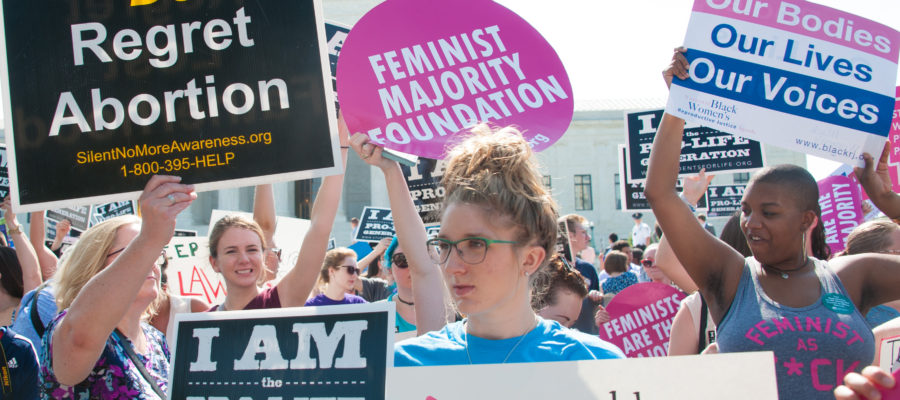I’m a feminist against abortion. Why exclude me from a march for women?
January 17, 2017 | Published first in CNN
I did not vote for President-Elect Donald Trump and continue to question his fitness to serve. Thus I am unsurprised that hundreds of thousands of women would want to protest his election this coming Saturday, the day after the inauguration. I am surprised, however, that the leaders of the Women’s March on Washington—and most feminists today—are so unwilling to listen to an alternative feminist perspective, one with deep roots in feminist history and a good deal to offer to women today.
As a pro-choice activist who helped lead my college’s Women’s Center in the 1990s, and now, decades later, as a pro-life feminist, I too have looked forward to the day when a strong and accomplished woman would lead our nation. But however strong and accomplished, Secretary Clinton was not the woman for me. To me she represents all the contradictions of abortion rights feminism, contradictions also conspicuous in the guiding principles of the Women’s March. In my view, an authentic women’s movement—one that properly extols human dignity, care, and non-violence—must be unabashedly pro-life.
With both Trump’s inauguration and the 44th anniversary of Roe v Wade decision fast approaching, I have been concerned that Donald Trump the man—as president of the United States—would actually strengthen in the American imagination the popular feminist fallacy that abortion is necessary to women’s equality. After all, Donald Trump as “pro-life candidate” fit perfectly the pro-choice caricature of an abortion opponent: degrading to and disrespectful of women. If I could say just one thing to those at the Women’s March, it would be this: the constitutional right to abortion has only made men like Trump worse.
Contraception fails. It just does. But constitutionalizing the right to abortion as Roe did in January 1973 hasn’t relieved women of the consequences of sex or the vulnerabilities of pregnancy. Rather it has detached men even further from sex’s procreative potential and, for the poor in particular, increased the vulnerability of both women and children. That is, easy abortion empowers the male illusion that sex can finally be completely consequence-free. For men, anyway.
The ascendancy of abortion rights feminism over the last fifty years has failed to remedy the sort of objectification of women on particular display by our president-elect in the unearthed Access Hollywoodvideo and beyond. As pro-life feminists have long argued, the undisciplined testosterone-driven male libido, interested in no-strings-attached sex, benefits most from an abortion-permissive culture. And when male sexuality goes undisciplined, bereft of the deep emotional bonds once demanded by self-respecting women, sex is sought for pleasure alone. For the most callous of men, women become mere pleasure-providers, the objects of the male libido’s aggressive demands.
Indeed, worry over the tendencies of dissolute men was a key reason women’s suffragists of the late 19th century did not see abortion as the panacea their successors have. Unlike today’s abortion-rights-feminists, the suffragists feared that sex unmoored from its procreative potential would increase male sexual immorality and infidelity. The suffragists were seeking just the reverse: “Votes for women, chastity for men” was actually a suffragist slogan.
And yet, in a bitter irony (with encouragement from some men), those carrying the feminist mantel in the 1970s abandoned this vision of sexual integrity for both sexes and legalized abortion became the sine qua non of sexual freedom. Transforming male-oriented institutions—and the men that governed them—was just too difficult: conforming women’s bodies seemed a far easier path. If men could reduce sex to sport, denying the intimate connection created with the women they bedded and the children they fathered, well, women ought to be able to do the same.
Only we can’t. Sex-induced hormones connect us more than “casual” sex would seem to allow. And women must worry about pregnancy, about how carrying a child would impact our bodies, and how caring for a child would shape our futures. And so, women also tend to see more clearly the vulnerability inherent in the human condition, the human goods brought about in giving care, and how our politics affect those at the margins.
So why would women ever think it “better” to treat sex, the act that creates new dependent human life, so casually, as if it lacked profound consequences for connection and caregiving? Why would any feminist think it is a moral advance for women to imitate male abandonment of the vulnerable through abortion?
Influential women such as Anne-Marie Slaughter thankfully have begun to highlight a more authentic feminist logic: if society better valued caregiving, then perhaps men would do more of it, and we’d see greater collaboration in the home, more equity in the workplace, and more family-friendly policies. But as pro-choice law professor Robin West has noticed, the constitutionalizing of abortion rights in Roe stands in dramatic tension with a political agenda that better values caregiving.
Were it not for the wedding of modern feminism with the sexual revolution, many more men, I think, would more readily value the culturally essential work of caregiving. Both research and my personal experience suggests that men who aren’t beholden to the fleeting attractions of sexual pleasure do value caregiving, and consider the nurture and education of their children their most essential work. I dare say that these men are the very picture of the emotionally available, responsible, and engaged husbands and fathers my feminist sisters and I once dreamed of. Abortion rights will not produce more such men; but a greater appreciation that sex is a serious enterprise just might.
Erika Bachiochi is a visiting fellow at the Ethics and Public Policy Center and author of “Embodied Equality: Debunking Equal Protection Arguments for Abortion Rights.”



